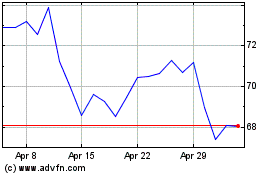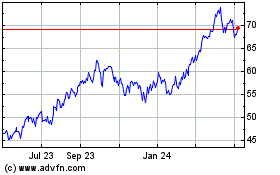MacKenzie Gas Pipeline Approved By Canada's Energy Regulator
December 16 2010 - 5:43PM
Dow Jones News
After a six-year review, Canada's National Energy Board Thursday
approved plans to build a 740-mile pipeline to ship natural gas
from the Arctic to points southward.
The decision removes a major hurdle for the C$16.2 billion
($16.1 billion) MacKenzie Gas Project, which proposes to bring
natural gas from fields in Canada's Northwest Territories bordering
the Arctic Ocean to other pipelines and refineries that serve the
North American market.
Engineering and field work on the project has been frozen since
2007 as the regulatory-review process dragged on. The pipeline--the
farthest along of three proposals to ship natural gas from the far
north--would be able to carry as much as 1.2 billion cubic feet per
day, and would go into service by 2018 at the earliest.
But even as project partners led by Calgary-based Imperial Oil
Ltd. (IMO, IMO.T) proceed to the next stage of development, some
industry watchers worry the project's economics no longer work out
due to a recent glut of natural gas pulled from rocks known as
shale. That glut has pushed natural-gas prices to just over $4 per
million British thermal units--well below the $6 to $7 price range
that project partners estimate they need to make the pipeline
feasible.
Canada's energy regulator approved the project even as it
acknowledged the steep drop in natural-gas prices since it was
first proposed.
"We do not agree with those who say these are reasons to deny
the project," it said in a lengthy report explaining its decision.
"It is up to the companies to decide whether the project makes
economic sense."
It added, however, that construction must begin by
2015--Imperial Oil had asked for a 2016 deadline, and said 2014 is
the earliest it could begin construction.
Imperial Oil spokesman Pius Rolheiser said his company remains
committed to pursuing the project, on the grounds that it believes
demand for natural gas will grow and supply from other sources will
decline.
However, Rolheiser said Imperial Oil won't be able to make an
investment decision until the end of 2013, and needs to work out an
agreement on taxes and royalties with the Canadian government--it
would also need to re-staff the project and file for more than
6,000 required permits. Imperial Oil and its partners have already
spent around C$750 million on preliminary engineering studies and
regulatory matters.
"We've known from the outset that this is a complex project,"
Rolheiser said. "The central challenge has always been and remains
that gas from the Mackenzie Delta needs to be competitive on a
supply-cost basis with other sources of supply."
Gregory Ebel, chief executive of Spectra Energy Corp. (SE), a
Houston, Texas-based company that operates Canadian natural-gas
pipelines in British Columbia, said the Mackenzie project is "a
very, very tough project given how far it is from market."
"The dynamics in the market are now significantly different from
what they once were," said Greg Stringham, vice president for
markets at the Canadian Association of Petroleum Producers. "It's
really a challenging time for all natural gas now."
The MacKenzie Gas Project partners--which also include an
aboriginal peoples' group as well as the Canadian arms of
ConocoPhillips (COP), Royal Dutch Shell PLC (RDSA, RDSA.LN) and
Exxon Mobil Corp. (XOM)--are counting on tightening natural-gas
supplies and rising prices during the next several years to put
their plans back on track.
"It's not the natural-gas price now--it's what it is when these
wells come into service" in 2018, says Bob Reid, president of the
Aboriginal Pipeline Group, which has a one-third stake in the
pipeline and represents the interests of three native groups over
whose land the pipeline will pass. "I'm confident we will make a
decision to construct."
Meanwhile, two other natural-gas pipeline projects are also
competing to bring another source of natural gas south, from
Alaska's North Shore. TransCanada Corp. (TRP, TRP.T) and Exxon
Mobil are asking natural-gas producers to support their project to
ship up to 4.5 billion cubic feet per day over the rival Denali
pipeline project supported by BP PLC (BP, BP.LN) and
ConocoPhillips, and which is expected to be completed by the end of
the decade.
-By Phred Dvorak and Edward Welsch, Dow Jones Newswires;
403-229-9095; edward.welsch@dowjones.com
Imperial Oil (AMEX:IMO)
Historical Stock Chart
From Jun 2024 to Jul 2024

Imperial Oil (AMEX:IMO)
Historical Stock Chart
From Jul 2023 to Jul 2024
